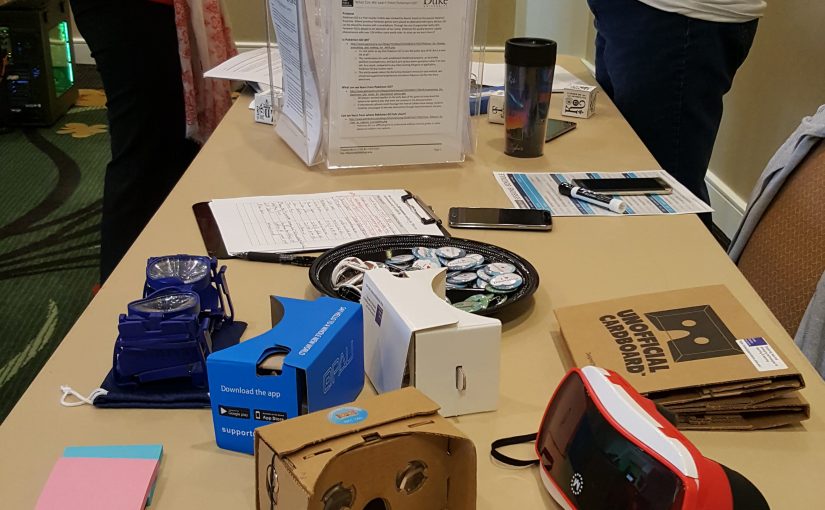Since 2004 the Duke Digital Initiative (DDI) has facilitated the exploration of emerging technologies that provide innovative and creative enhancements to teaching and learning at Duke. Jointly managed by the Office of Information Technology (OIT) and the Center for Instructional Technology (CIT), DDI programs have helped to drive strategic innovations in instruction, learning, and undergraduate life by connecting our community with new and emerging technologies.
Immersive presentations using robotic imagery capture
Dan Cantrell, Hollie White, Wayne Miller, Miguel Bordo, Jeff Saul: Law School
This project will use 360 video to allow students to capture imagery from a staged crime scene and create a 3D stereoscopic presentation for a juror during educational exercises. The primary goals for this project are 1) students will understand the capabilities of current technology to capture 360 degree images and video; 2) students will be taught to add impact to an oral argument by creating an immersive presentation using 360 images and video; 3) faculty will be able to deploy the technology into existing coursework with minimal additional time investment, with high degree of success and very low amount of time spent preparing the deployment of technology assets; and 4) Law School IT staff will gain experience in creating detailed documentation and streamlined processes that allow faculty to include complex technology in their coursework with minimal time investment.
Scanning the “Roman Puzzle”
Maurizio Forte, Classical Studies
This proposal will help create a 3D repository of 100 archeological fragments. The Museum of the Imperial Fora in the Markets of Trajan is the most important archaeological museum in Rome. Since 1985 over 40,000 fragments originating from the imperial Fora have been collected in the deposits created when excavations were carried out earlier in the 20th century. The re-composition of all these fragments is one of the key challenges for archaeologists and art historians and is the reason for the project title: “The Roman Puzzle.” The first phase of the work will be the digital recording on site, in Rome, of 100-200 architectural fragments. The second phase will place the models into a 3D online platform developed by Duke University. The third phase will 3D print digital models (about 100) at Duke for educational purposes and local exhibitions. DDI is funding a sophisticated portable 3D scanner for the first phase of the project. After the project is complete, the scanner will be available to the Duke community through the Technology Engagement Center.
Virtual reality in the Middle East
Maha Houssami, Thatcher Owen: Middle Eastern Studies
This project will help students explore the physical landscape and complex social issues of the Middle East. First year Arabic students will explore and describe a marketplace in Morocco. Second year students will explore Lebanon and explain the socioeconomic topography. Third year students will experience a refugee camp and debate the courses of action needed for international cooperation. Some video will be recorded by graduate students while they are in countries of interest using a 360 camera. Some video will come from other sources that are free to use for this purpose. Students will engage with the video using virtual reality headsets and cell phones. Goals are to 1) facilitate classroom discussion of salient issues in the Middle East and North Africa; 2) bring Arabic culture to students in the classroom who do not have opportunity to travel; 3) collect 360 video from the most vibrant aspects of Arabic cultureand from areas where the culture is at risk of disappearing or becoming permanently changed because of war or immigration; 4)introduce modern technology to language learning.
Digital learning platform and gameplay: Assessment of integration of analog games and digital platforms in AMES 440S: Games and Culture
Shai Ginsburg and Leo Ching/Asian and Middle Eastern Studies
CIT and the Duke Digital Initiative (DDI) co-funded this project with two aspects: support for development of a serious game on conflict resolution incorporating cultural elements, and exploring how to effectively incorporate both analog and digital aspects into the game.
Funded staff proposals for equipment:
- MiniMill for Co-Lab/Innovation Studio
- 360 Cameras for DDI exploration (Ricoh Theta S and Nikon KeyMission 360)
- Sewing Machine for Co-Lab/Innovation Studio
- Updated computer to run Oculus Rift for DDI exploration
- Touch accessory for Oculus Rift
